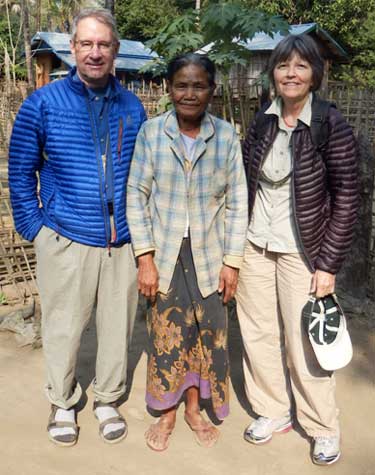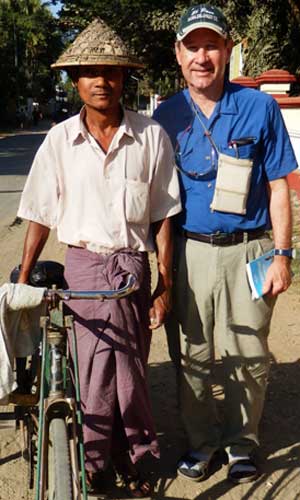Distinguished Research Professor Kenton Clymer is back at the Department of History after spending the month of December teaching at Yangon University in Burma, known officially as Myanmar.
The first foreign visiting professor to teach at Yangon’s Department of History since 1962, Clymer was invited by department head and professor Margaret Wong following the visit of an NIU delegation last summer. Clymer taught a course on the history of U.S. relations with the Southeast Asian country since World War II.
Clymer’s visit part of Yangon University’s efforts at revitalization after years of isolation and neglect, he said.
In 1962 Prime Minister Ne Win began closing the country to foreign influences, and after the revolution of Aug. 8, 1988 (8/8/88), he closed Yangon University to undergraduate students because of students’ prominent role in the uprising that year. After 1988, only limited numbers of graduate students were enrolled. Not until December 2013 were undergraduate students allowed back in.
NIU has been actively involved in the revitalization effort.
Clymer’s teaching stint follows that of NIU English professor Amy Levin, who taught in the university’s Literature Department last February under a Fulbright appointment.
Other U.S. educational institutions were also present on campus. Lillian Handlin of Harvard University, current editor of the Journal of Burma Studies (published at NIU), was there teaching a course in Burmese archaeology. Representatives from Johns Hopkins University’s School of Advanced International Studies (SAIS), which has been running an international relations certificate program there for the past several months, were also present, Clymer said.
As it turned out, most of the 20 to 50 students in Clymer’s class were history faculty members.
While Clymer conducted his 90-minute classes in English, he said that he found that the English skill level of the students varied considerably.
To even the language levels, Clymer used more detailed PowerPoint presentations than usual, he said, and allotted plenty of time for discussion of the material presented. “Students frequently came to my office after class to continue the discussion,” he said.
Clymer said he particularly enjoyed the opportunity to teach this class in Yangon because he has just completed a manuscript for a forthcoming book on the history of U.S. relations with Burma/Myanmar since World War II.
“It was an honor to be able to present my findings to Burmese students and to get their reactions to what I had to say,” said Clymer, a faculty associate with NIU’s Center for Southeast Asian Studies.
During his time at Yangon, Clymer also spoke to one class of new undergraduate International Relations students, who he found to be “smart, inquisitive and fluent in English.”
Although most of his time was spent teaching, Clymer and his wife, Marlee, took a short trip to Rakhine State, where they visited the towns of Sittwe and Mrauk U. The latter is home to a 15th- to 18th-century temple complex.
“The complex is not as old as Pagan in Burma (12th- to 14th-century) or Angkor in Cambodia (ninth- to 14th-century), nor it is as extensive,” Clymer said. “There are villages and farms within the temple context. But it was quite lovely, and with almost no tourists – a real advantage.”


